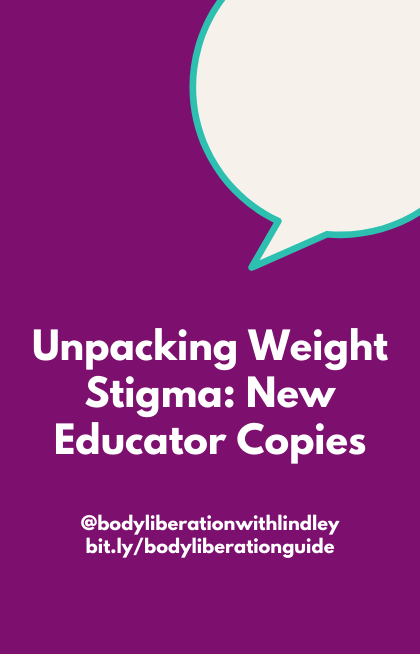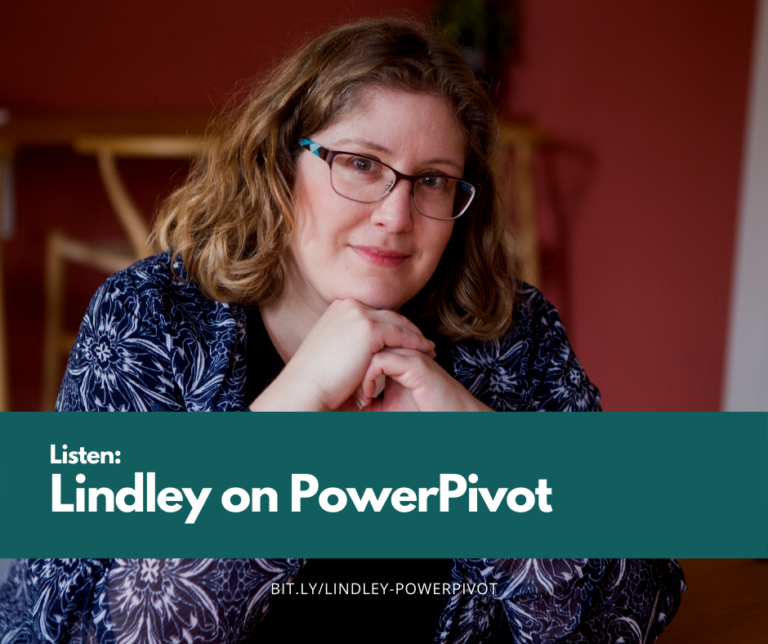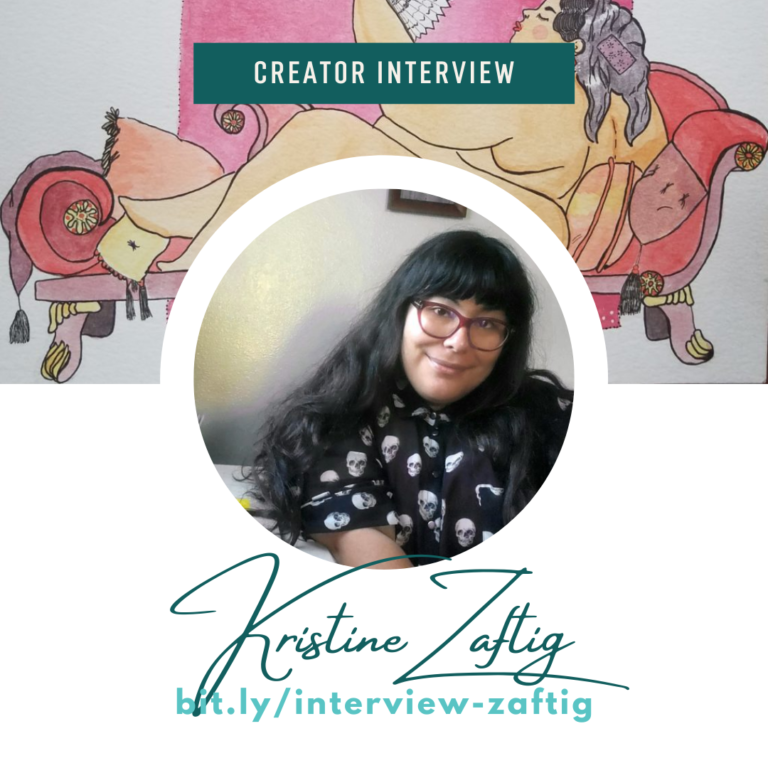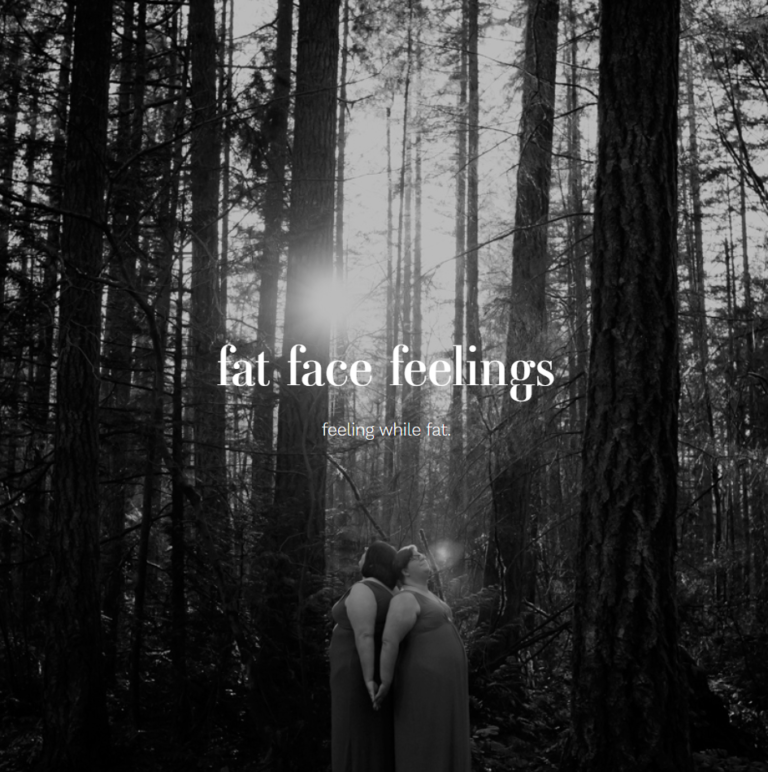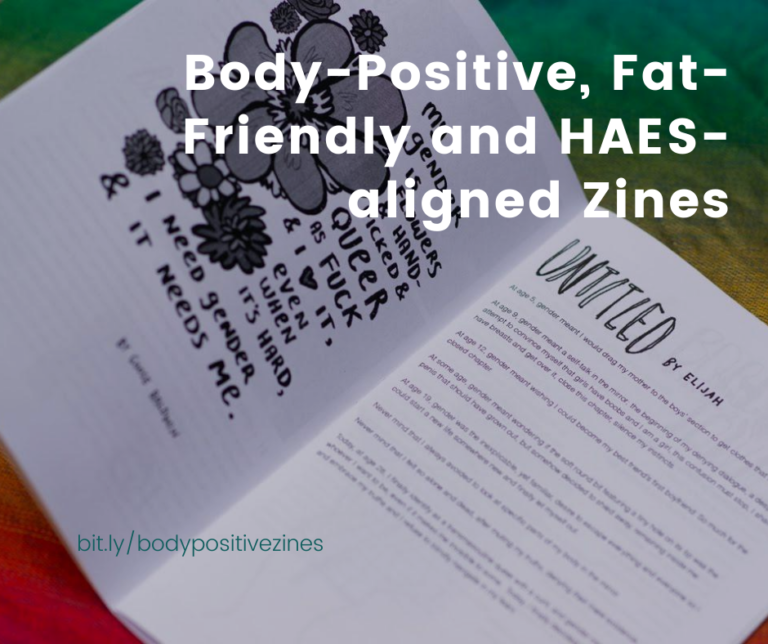Ask a Fat Ally: Artist Theresa Baxter
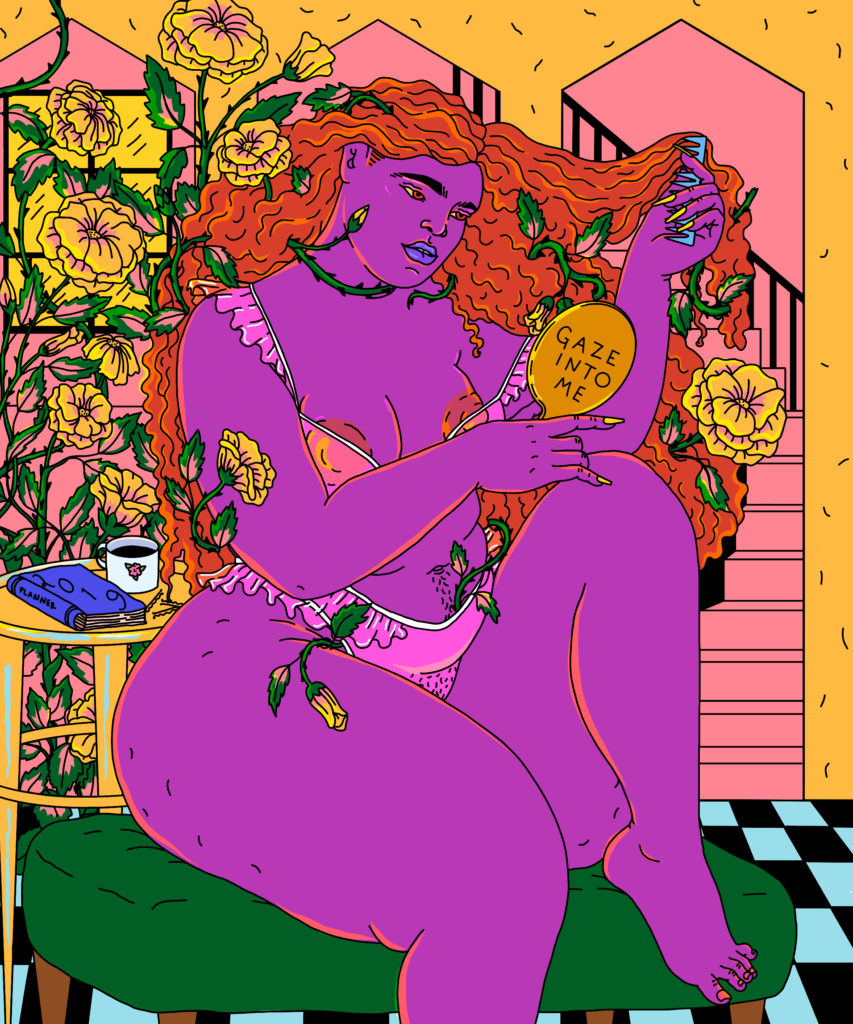
This is the Body Liberation Photos Ask a Fat Creator (and Allies) series, in which we find out more about the lives, work and breakfasts of all kinds of large-bodied and marginalized creators.
Theresa is an illustrator and creative entrepreneur with a background in art therapy and psychology. She is passionate about the power of creative business and art and design as tools for radical paradigm shift. She believes that we can change ourselves and our world through representation.
Tell me about you! What’s your name? What pronouns do you use? Where do you live? What do you like to eat for breakfast?
Theresa, she/her, Scorpio sun, Sag moon, Gemini rising. I live in Los Angeles. Breakfast is my favorite meal of the day. Hands down. Give me any savory breakfast food and I will eat the fuck out of it; lemme get an omelette, lemme get a veggie scramble with lots of cheese, lemme get some huevos rancheros, a breakfast burrito, some fancy avocado toast and a side of bacon, eggs benedict, with the tapatio and the hashbrowns. And I’ll have a coffee and sparkling water please. Maybe even a juice.
“I believe deeply in the transformational power of honest and vulnerable representation.”
What is your business, and how does it make a difference in the world?
First and foremost, I am an illustrator. I believe deeply in the transformational power of honest and vulnerable representation. My background is in art therapy; a career I decided to put off until later in life, but I use my own art making practice to process, and specifically my relationship with myself and my body. I am blessed to have found an outlet and a corner of the internet where I can commiserate with others through vulnerable self-expression.
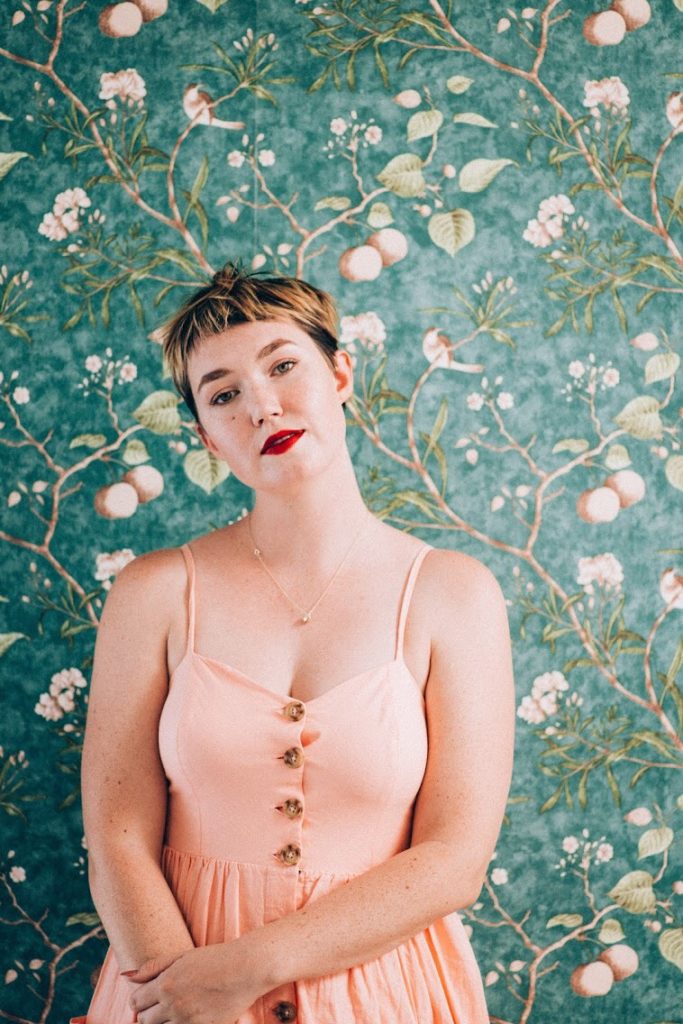
I also co-own two creative businesses; an art studio space called Allmost, providing accessible creative space and community for creative entrepreneurs and artists in MidCity, Los Angeles. And a retail collective in Silverlake; where we provide a brick and mortar infrastructure for local makers and artisans to sell and grow their independent brands. Both of these businesses give artists and creative entrepreneurs a platform for growth in Los Angeles, which I believe is incredibly important for the future of my city.
Why is what you do important? How does it change the way people see or how they feel about their bodies?
As artists, we have a unique opportunity to create from our own experiences and to turn pain into beauty. I think that what I do as an illustrator is important because representation is important; I am one of many artists using our toolboxes to challenge the status quo, and the idea of “right” bodies.

What’s your most popular item/service, or the one you most enjoy doing/making?
I LOVE the process of printing on tees. It is the perfect coming together of everything that I am passionate about. First of all, I get to create original designs or repurpose my illustrations. I then source vintage and thrifted tees locally; reducing waste, giving back to my local economy and satiating my love of scrounging around for special things to buy. Once the perfect shirts are found for the design, I pass these off to my local female-owned and operated screen-printing business where they are printed by hand. Each shirt is truly locally made and one-of-a-kind, and I get so much joy out of every step of the process. I then sell my one-offs and super limited runs at my store Allright Collective, and list my more consistent runs online. And people buy them! That’s the craziest and coolest part!
“Because it is important to me that I am able to offer inclusive sizing, but I also want to keep my supply chain local and sustainable. And let me tell you, it is a struggle to find thrifted sizes past 2xl…which is symptomatic of the fashion system we live in in general. I aspire to be in a financial place with my brand to be sewing my own tees – but I won’t take this on until I can be sure to keep it local and sustainable.”
I will say that there are challenges in this arena, specifically for myself as a body-positive artist. Because it is important to me that I am able to offer inclusive sizing, but I also want to keep my supply chain local and sustainable. And let me tell you, it is a struggle to find thrifted sizes past 2xl…which is symptomatic of the fashion system we live in in general. I aspire to be in a financial place with my brand to be sewing my own tees – but I won’t take this on until I can be sure to keep it local and sustainable.
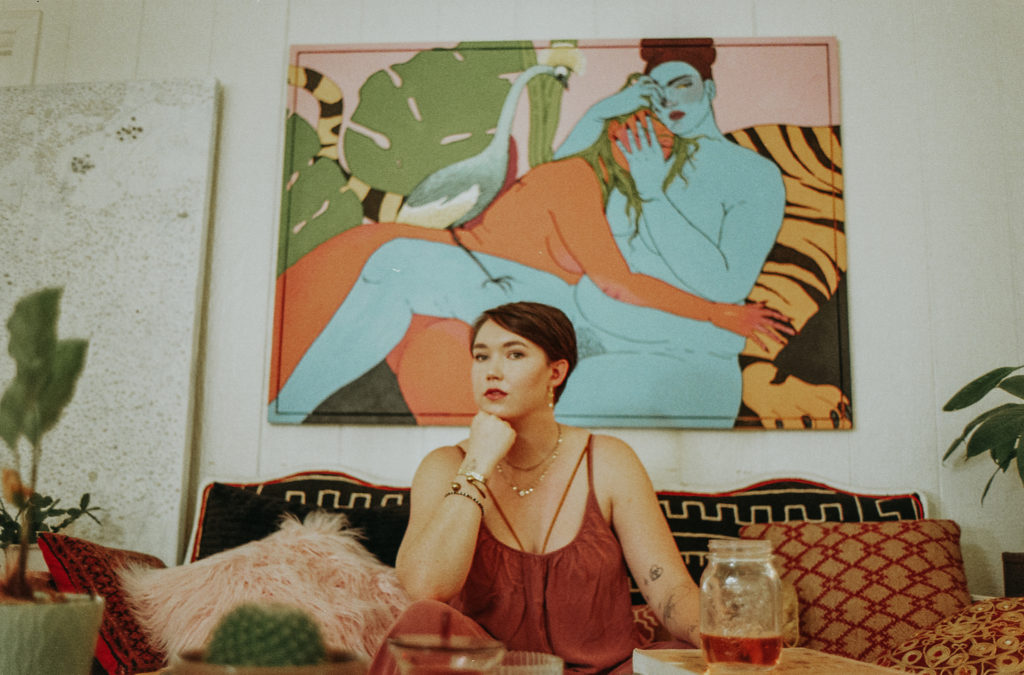
How does body positivity or fat positivity make your business different from others in your field? What has your experience been like?
There are a lot of us out here making art that glorifies curves and rolls and softness. And it is very uplifting and powerful to count myself as part of this movement. But while there are many of us, the norm in the traditional art world still feeds into our societal obsession with thinness and one kind of beauty and sexiness. And even the idea that a nude is inherently sexy.
How does body positivity or fat positivity make your business different from others in your field? What has your experience been like?
There are a lot of us out here making art that glorifies curves and rolls and softness. And it is very uplifting and powerful to count myself as part of this movement. But while there are many of us, the norm in the traditional art world still feeds into our societal obsession with thinness and one kind of beauty and sexiness. And even the idea that a nude is inherently sexy.
My work has been met with a huge outpouring of support. But I have had my share of criticism…I am a relative newcomer to the body positive community and my own body kind of teeters on both sides of the “plus” line. Certainly, I am always growing and learning. There are so very many aspects of daily life that have been conditioned by body shame and thin culture, and there have been many times that I have unconsciously fed into this, even very recently. Being a part of this community means constantly examining my own dumb brain, which I welcome.

Can you share an instance where you made a real difference for a customer, or had some really great feedback from them about your body-positive work?
I get a lot of messages from customers and followers telling me that they see themselves in my work. I am always so heartened to hear that I’ve created something that makes someone feel seen. That is my highest goal. To validate the experience of another by sharing my own.
How did you discover body acceptance or body positivity personally? What kind of difference has it made for you?
I have struggled with my own self-image my entire life; I have tried to control and punish my body into being the shape and size that I thought it needed to be for me to be valid and accepted and worthy of love. I starved myself and abused exercise most of my life. And I had always drawn thin female bodies; reflecting what I thought I had to be (and was). And when I was 24, and starting my first business, suddenly this need was eclipsed by getting my business baby off the ground. I was in over my head and frankly, I didn’t have time to work out every day and obsess about what I ate. And I gained weight. And for awhile I was so insecure and self-hating in this “new” body. I hated looking at myself in the mirror, I was ashamed of my body. I didn’t feel sexy. I hated getting dressed and shopping and I felt like I had failed.
This was also around the same time that I had started posting my work on Instagram, after not making art consistently for ages. It started with a project, that I’ll call the muse project – I posted in a local women’s Facebook group asking if anyone would be willing to send me nudes so that I could draw them. The interest was overwhelming, my inbox was flooded with nudes. Professional photos, mirror pics, the gambit. And I got submissions from many fat and curvy babes – presenting themselves as they felt beautiful; shameless and lovely. At first I was terrified to draw them, thinking they would want to be presented smaller than they were, and how was I going to tow the line? How would I draw them without hurting them and their self-image? Because my belief that skinny = beautiful was so deeply ingrained. But I drew them as they presented themselves, and the response was earth shattering for me. “Thank you for drawing me as I am”, “I see my curves and I feel sexy”. So I kept going. And in this process, I found myself in a body positive / fat positive community on the internet. And as a result, the images that I was seeing daily started to change…now my feed is full of all kinds of bodies, and slowly my conditioning changed.
Honestly, I have learned by example to practice loving myself and my body as it is. And this example was set for me by my internet community; which grew every time I confronted my own hard-wired ideas about what bodies should be through my own illustration work. It took literally re-drawing the lines of the human form over and over again for me to understand that it is normal for bodies to be unique and that mine, soft and dimpled, was normal…and even beautiful, (and actually, really fucking sexy).
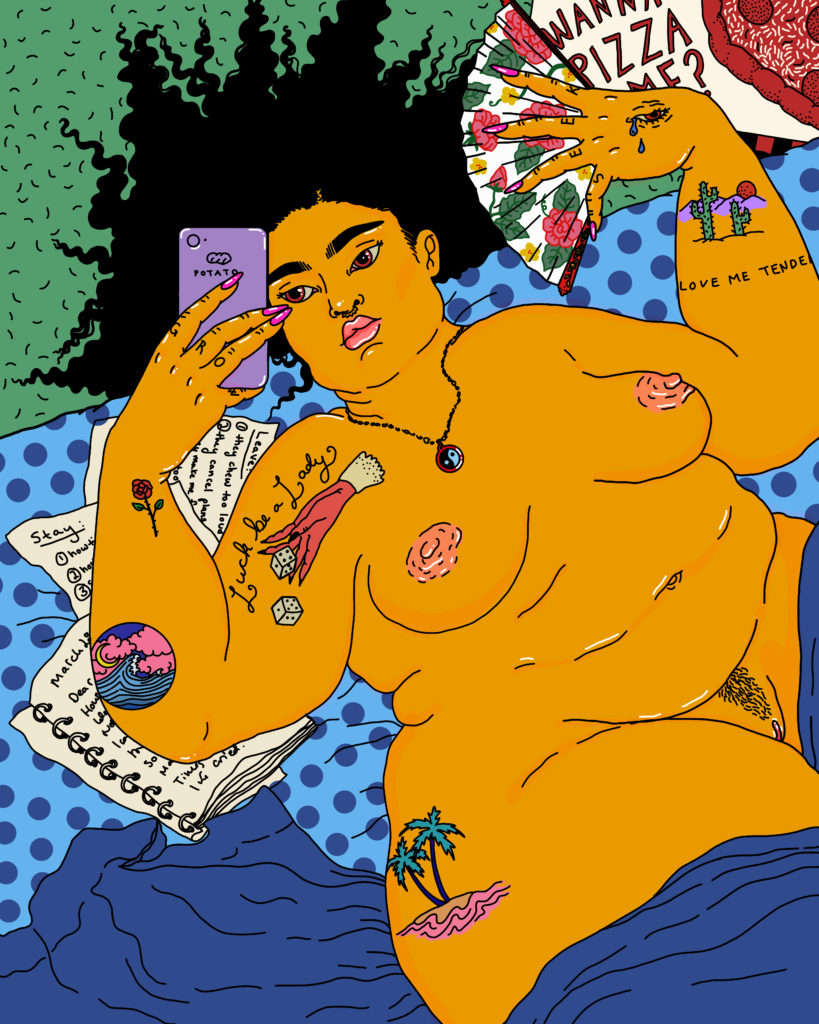
“It took literally re-drawing the lines of the human form over and over again for me to understand that it is normal for bodies to be unique and that mine, soft and dimpled, was normal…and even beautiful, (and actually, really fucking sexy).”
This shift happened first in accepting and celebrating other people’s bodies; I’m still working on my relationship with my own. We’re getting to know each other a lot better, and things are looking up.
What advice do you have for other people who are learning to love and accept their bodies?
Start with baby steps. And if you are starting from a place of body loathing, maybe start to work with the idea of body neutrality, rather than body love or body positivity, first.
What advice do you have for other business owners who’d like to incorporate body acceptance into their work?
Self-hatred and shame is a manufactured. We’ve been made to feel imperfect and wrong so that we’ll buy things…it’s that simple. We are all fucked up in thinking that we’re inherently wrong, and addicted to the validation that comes with achieving something close to the impossible standard of beauty.
It was important for me to understand that, first and foremost. There is no real right and wrong way to be a body; your body is wiser than the advertising industry. Your body is it’s own ecosystem, it is your home planet, it’s a garden. We don’t tell flowers how to grow, so why judge and shame our bodies for growing and changing?
Switch up your timeline, your feed and your media consumption in general. Seek out new sources of media that glorify and normalize fat bodies. Look at the things that scare you in the face; be honest with yourself about your body. Get familiar with it. Look at it and try to quiet your running commentary as you do. Stop sucking in your belly in the mirror. What does it actually look like? What does it feel like?
Get to know your body; be truly present. Focus on things that feel good. Eat when you’re hungry, eat what your body is craving. Move the way your body wants to move. Sleep naked in satin sheets. Wear soft clothing. Adorn yourself. Forgive yourself.
“It was important for me to understand that, first and foremost. There is no real right and wrong way to be a body; your body is wiser than the advertising industry. Your body is it’s own ecosystem, it is your home planet, it’s a garden. We don’t tell flowers how to grow, so why judge and shame our bodies for growing and changing?”
If you have a creative outlet, use it to confront your fears!
Where can we find more of your amazing work?
- http://www.theresabaxter.me/
- https://www.instagram.com/reesabobeesa/
Hi there! I'm Lindley. I create artwork that celebrates the unique beauty of bodies that fall outside conventional "beauty" standards at Body Liberation Photography. I'm also the creator of Body Liberation Stock and the Body Love Shop, a curated central resource for body-friendly artwork and products. Find all my work here at bodyliberationphotos.com.
- Lindley Ashline
- Lindley Ashline
- Lindley Ashline
- Lindley Ashline
- Lindley Ashline
- Lindley Ashline
- Lindley Ashline
- Lindley Ashline
- Lindley Ashline
- Lindley Ashline
- Lindley Ashline
- Lindley Ashline
- Lindley Ashline
- Lindley Ashline
- Lindley Ashline
- Lindley Ashline
- Lindley Ashline
- Lindley Ashline
- Lindley Ashline
- Lindley Ashline
- Lindley Ashline
- Lindley Ashline
- Lindley Ashline
- Lindley Ashline
- Lindley Ashline
- Lindley Ashline
- Lindley Ashline
- Lindley Ashline
- Lindley Ashline
- Lindley Ashline
- Lindley Ashline
- Lindley Ashline
- Lindley Ashline
- Lindley Ashline
- Lindley Ashline
- Lindley Ashline
- Lindley Ashline
- Lindley Ashline
- Lindley Ashline
- Lindley Ashline
- Lindley Ashline
- Lindley Ashline
- Lindley Ashline
- Lindley Ashline
- Lindley Ashline
- Lindley Ashline
- Lindley Ashline
- Lindley Ashline
- Lindley Ashline
- Lindley Ashline
- Lindley Ashline
- Lindley Ashline
- Lindley Ashline
- Lindley Ashline
- Lindley Ashline
- Lindley Ashline
- Lindley Ashline
- Lindley Ashline
- Lindley Ashline
- Lindley Ashline
- Lindley Ashline
- Lindley Ashline
- Lindley Ashline
- Lindley Ashline
- Lindley Ashline
- Lindley Ashline
- Lindley Ashline
- Lindley Ashline
- Lindley Ashline
- Lindley Ashline
- Lindley Ashline
- Lindley Ashline
- Lindley Ashline
- Lindley Ashline
- Lindley Ashline
- Lindley Ashline
- Lindley Ashline
- Lindley Ashline
- Lindley Ashline
- Lindley Ashline
- Lindley Ashline
- Lindley Ashline
- Lindley Ashline
- Lindley Ashline
- Lindley Ashline
- Lindley Ashline
- Lindley Ashline
- Lindley Ashline
- Lindley Ashline
- Lindley Ashline
- Lindley Ashline
- Lindley Ashline
- Lindley Ashline
- Lindley Ashline
- Lindley Ashline
- Lindley Ashline
- Lindley Ashline
- Lindley Ashline
- Lindley Ashline
- Lindley Ashline
- Lindley Ashline
- Lindley Ashline
- Lindley Ashline
- Lindley Ashline
- Lindley Ashline
- Lindley Ashline
- Lindley Ashline
- Lindley Ashline
- Lindley Ashline
- Lindley Ashline
- Lindley Ashline
- Lindley Ashline
- Lindley Ashline
- Lindley Ashline
- Lindley Ashline
- Lindley Ashline
- Lindley Ashline
- Lindley Ashline
- Lindley Ashline
- Lindley Ashline
- Lindley Ashline
- Lindley Ashline
- Lindley Ashline
- Lindley Ashline
- Lindley Ashline
- Lindley Ashline
- Lindley Ashline
- Lindley Ashline
- Lindley Ashline
- Lindley Ashline
- Lindley Ashline
- Lindley Ashline
- Lindley Ashline
- Lindley Ashline
- Lindley Ashline
- Lindley Ashline
- Lindley Ashline
- Lindley Ashline
- Lindley Ashline
- Lindley Ashline
- Lindley Ashline
- Lindley Ashline
- Lindley Ashline
- Lindley Ashline
- Lindley Ashline
- Lindley Ashline
- Lindley Ashline
- Lindley Ashline
- Lindley Ashline
- Lindley Ashline
- Lindley Ashline
- Lindley Ashline
- Lindley Ashline
- Lindley Ashline
- Lindley Ashline
- Lindley Ashline
- Lindley Ashline
- Lindley Ashline
- Lindley Ashline
- Lindley Ashline
- Lindley Ashline
- Lindley Ashline
- Lindley Ashline
- Lindley Ashline
- Lindley Ashline
- Lindley Ashline
- Lindley Ashline
- Lindley Ashline
- Lindley Ashline
- Lindley Ashline
- Lindley Ashline
- Lindley Ashline
- Lindley Ashline
- Lindley Ashline
- Lindley Ashline
- Lindley Ashline
- Lindley Ashline
- Lindley Ashline
- Lindley Ashline
- Lindley Ashline
- Lindley Ashline
- Lindley Ashline
- Lindley Ashline
- Lindley Ashline
- Lindley Ashline
- Lindley Ashline
- Lindley Ashline
- Lindley Ashline
- Lindley Ashline
- Lindley Ashline
- Lindley Ashline
- Lindley Ashline
- Lindley Ashline
- Lindley Ashline
- Lindley Ashline
- Lindley Ashline
- Lindley Ashline
- Lindley Ashline
- Lindley Ashline
- Lindley Ashline
- Lindley Ashline
- Lindley Ashline
- Lindley Ashline
- Lindley Ashline
- Lindley Ashline
- Lindley Ashline
- Lindley Ashline
- Lindley Ashline
- Lindley Ashline
- Lindley Ashline
- Lindley Ashline
- Lindley Ashline
- Lindley Ashline
- Lindley Ashline
- Lindley Ashline
- Lindley Ashline
- Lindley Ashline
- Lindley Ashline
- Lindley Ashline
- Lindley Ashline
- Lindley Ashline
- Lindley Ashline
- Lindley Ashline
- Lindley Ashline
- Lindley Ashline
- Lindley Ashline
- Lindley Ashline
- Lindley Ashline
- Lindley Ashline
- Lindley Ashline
- Lindley Ashline
- Lindley Ashline
- Lindley Ashline
- Lindley Ashline
- Lindley Ashline
- Lindley Ashline
- Lindley Ashline
- Lindley Ashline
- Lindley Ashline
- Lindley Ashline
- Lindley Ashline
- Lindley Ashline
- Lindley Ashline
- Lindley Ashline
- Lindley Ashline
- Lindley Ashline
- Lindley Ashline
- Lindley Ashline
- Lindley Ashline
- Lindley Ashline
- Lindley Ashline
- Lindley Ashline
- Lindley Ashline
- Lindley Ashline
- Lindley Ashline
- Lindley Ashline
- Lindley Ashline
- Lindley Ashline
- Lindley Ashline
- Lindley Ashline
- Lindley Ashline
- Lindley Ashline
- Lindley Ashline
- Lindley Ashline
- Lindley Ashline
- Lindley Ashline
- Lindley Ashline
- Lindley Ashline
- Lindley Ashline
- Lindley Ashline
- Lindley Ashline
- Lindley Ashline
- Lindley Ashline
- Lindley Ashline
- Lindley Ashline
- Lindley Ashline
- Lindley Ashline
- Lindley Ashline
- Lindley Ashline
- Lindley Ashline
- Lindley Ashline
- Lindley Ashline
- Lindley Ashline
- Lindley Ashline
- Lindley Ashline
- Lindley Ashline
- Lindley Ashline
- Lindley Ashline
- Lindley Ashline
- Lindley Ashline
- Lindley Ashline
- Lindley Ashline
- Lindley Ashline
- Lindley Ashline
- Lindley Ashline
- Lindley Ashline
- Lindley Ashline
- Lindley Ashline
- Lindley Ashline
- Lindley Ashline
- Lindley Ashline
- Lindley Ashline
- Lindley Ashline
- Lindley Ashline
- Lindley Ashline
- Lindley Ashline
- Lindley Ashline
- Lindley Ashline
- Lindley Ashline
- Lindley Ashline
- Lindley Ashline
- Lindley Ashline
- Lindley Ashline
- Lindley Ashline
- Lindley Ashline
- Lindley Ashline
- Lindley Ashline
- Lindley Ashline
- Lindley Ashline
- Lindley Ashline
- Lindley Ashline
- Lindley Ashline
- Lindley Ashline
- Lindley Ashline
- Lindley Ashline
- Lindley Ashline
- Lindley Ashline
- Lindley Ashline
- Lindley Ashline
- Lindley Ashline
- Lindley Ashline
- Lindley Ashline
- Lindley Ashline
- Lindley Ashline
- Lindley Ashline
- Lindley Ashline
- Lindley Ashline
- Lindley Ashline
- Lindley Ashline
- Lindley Ashline
- Lindley Ashline
- Lindley Ashline
- Lindley Ashline
- Lindley Ashline
- Lindley Ashline
- Lindley Ashline
- Lindley Ashline
- Lindley Ashline
- Lindley Ashline
- Lindley Ashline
- Lindley Ashline
- Lindley Ashline
- Lindley Ashline
- Lindley Ashline
- Lindley Ashline
- Lindley Ashline
- Lindley Ashline
- Lindley Ashline
- Lindley Ashline
- Lindley Ashline
- Lindley Ashline
- Lindley Ashline
- Lindley Ashline
- Lindley Ashline
- Lindley Ashline
- Lindley Ashline
- Lindley Ashline
- Lindley Ashline
- Lindley Ashline
- Lindley Ashline
- Lindley Ashline
- Lindley Ashline
- Lindley Ashline
- Lindley Ashline
- Lindley Ashline
- Lindley Ashline
- Lindley Ashline
- Lindley Ashline
- Lindley Ashline
- Lindley Ashline
- Lindley Ashline
- Lindley Ashline
- Lindley Ashline
- Lindley Ashline
- Lindley Ashline
- Lindley Ashline
- Lindley Ashline
- Lindley Ashline
- Lindley Ashline
- Lindley Ashline
- Lindley Ashline
- Lindley Ashline
- Lindley Ashline
- Lindley Ashline
- Lindley Ashline
- Lindley Ashline
- Lindley Ashline
- Lindley Ashline
- Lindley Ashline
- Lindley Ashline
- Lindley Ashline
- Lindley Ashline
- Lindley Ashline
- Lindley Ashline
- Lindley Ashline
- Lindley Ashline
- Lindley Ashline
- Lindley Ashline
- Lindley Ashline
- Lindley Ashline
- Lindley Ashline
- Lindley Ashline
- Lindley Ashline
- Lindley Ashline
- Lindley Ashline
- Lindley Ashline
- Lindley Ashline
- Lindley Ashline
- Lindley Ashline
- Lindley Ashline
- Lindley Ashline
- Lindley Ashline
- Lindley Ashline
- Lindley Ashline
- Lindley Ashline
- Lindley Ashline
- Lindley Ashline
- Lindley Ashline
- Lindley Ashline
- Lindley Ashline
- Lindley Ashline
- Lindley Ashline
- Lindley Ashline
- Lindley Ashline
- Lindley Ashline
- Lindley Ashline
- Lindley Ashline
- Lindley Ashline
- Lindley Ashline
- Lindley Ashline
- Lindley Ashline
- Lindley Ashline
- Lindley Ashline
- Lindley Ashline
- Lindley Ashline
- Lindley Ashline
- Lindley Ashline
- Lindley Ashline
- Lindley Ashline
- Lindley Ashline
- Lindley Ashline
- Lindley Ashline
- Lindley Ashline
- Lindley Ashline
- Lindley Ashline
- Lindley Ashline
- Lindley Ashline
- Lindley Ashline
- Lindley Ashline
- Lindley Ashline
- Lindley Ashline
- Lindley Ashline
- Lindley Ashline
- Lindley Ashline
- Lindley Ashline
- Lindley Ashline
- Lindley Ashline
- Lindley Ashline
- Lindley Ashline
- Lindley Ashline
- Lindley Ashline
- Lindley Ashline
- Lindley Ashline
- Lindley Ashline
- Lindley Ashline
- Lindley Ashline
- Lindley Ashline
- Lindley Ashline
- Lindley Ashline
- Lindley Ashline
- Lindley Ashline
- Lindley Ashline
- Lindley Ashline
- Lindley Ashline
- Lindley Ashline
- Lindley Ashline
- Lindley Ashline
- Lindley Ashline
- Lindley Ashline
- Lindley Ashline
- Lindley Ashline
- Lindley Ashline
- Lindley Ashline
- Lindley Ashline
- Lindley Ashline
- Lindley Ashline
- Lindley Ashline
- Lindley Ashline
- Lindley Ashline
- Lindley Ashline
- Lindley Ashline
- Lindley Ashline
- Lindley Ashline
- Lindley Ashline
- Lindley Ashline
- Lindley Ashline
- Lindley Ashline
- Lindley Ashline
- Lindley Ashline
- Lindley Ashline
- Lindley Ashline
- Lindley Ashline
- Lindley Ashline
- Lindley Ashline
- Lindley Ashline
- Lindley Ashline
- Lindley Ashline
- Lindley Ashline
- Lindley Ashline
- Lindley Ashline
- Lindley Ashline
- Lindley Ashline
- Lindley Ashline
- Lindley Ashline
- Lindley Ashline
- Lindley Ashline
- Lindley Ashline
- Lindley Ashline
- Lindley Ashline
- Lindley Ashline
- Lindley Ashline
- Lindley Ashline
- Lindley Ashline
- Lindley Ashline
- Lindley Ashline
- Lindley Ashline
- Lindley Ashline
- Lindley Ashline
- Lindley Ashline
- Lindley Ashline
- Lindley Ashline
- Lindley Ashline
- Lindley Ashline
- Lindley Ashline
- Lindley Ashline
- Lindley Ashline
- Lindley Ashline
- Lindley Ashline
- Lindley Ashline
- Lindley Ashline
- Lindley Ashline
- Lindley Ashline
- Lindley Ashline
- Lindley Ashline
- Lindley Ashline
- Lindley Ashline
- Lindley Ashline
- Lindley Ashline
- Lindley Ashline
- Lindley Ashline
- Lindley Ashline
- Lindley Ashline
- Lindley Ashline
- Lindley Ashline
- Lindley Ashline
- Lindley Ashline
- Lindley Ashline
- Lindley Ashline
- Lindley Ashline
- Lindley Ashline
- Lindley Ashline
- Lindley Ashline
- Lindley Ashline
- Lindley Ashline
- Lindley Ashline
- Lindley Ashline
- Lindley Ashline
- Lindley Ashline
- Lindley Ashline
- Lindley Ashline
- Lindley Ashline
- Lindley Ashline
- Lindley Ashline
- Lindley Ashline
- Lindley Ashline
- Lindley Ashline
- Lindley Ashline
- Lindley Ashline
- Lindley Ashline
- Lindley Ashline
- Lindley Ashline
- Lindley Ashline



